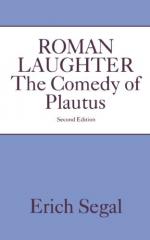|
This section contains 15,294 words (approx. 51 pages at 300 words per page) |

|
SOURCE: "Plautus," in A Handbook of Classical Drama, Stanford University Press, 1944, pp. 333-74.
In the following excerpt, Harsh offers an overview of Plautus's major plays, commenting on the source materials, plots, and the influence of the plays on later works.
The twenty extant plays of Plautus constitute an astonishingly varied collection of good, bad, and indifferent comedies. Even the worst, however, usually have one or more effective scenes, and most of the indifferent ones doubtless were successful in his theater. For modern dramatists, good and bad alike have served as a continually plundered storehouse of interesting comic characters and amusing situations. The structure of the Amphitryon, for instance, is not well proportioned, to say the least; but the play's situation is so infallibly amusing that it has attracted innumerable adapters. Nor have imitators been frightened away from the Twin Menaechmi merely because its basic situation is fantastically improbable...
|
This section contains 15,294 words (approx. 51 pages at 300 words per page) |

|


